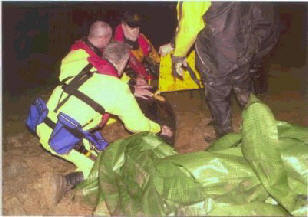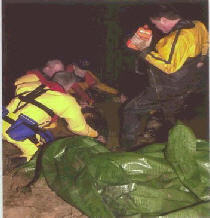|
When we arrived we discovered that a member of the public had pushed it back into the river. The porpoise was now lying in about two feet of water. She was laying on very soft mud which made it extremely hazardous to get to her, we were also losing light as it was now about six o’ clock. So the local fire brigade came to our rescue by providing lights and an inflatable walkway that enabled us to get to the animal.
By now there were five members of the coastguard, three RSPCA Inspectors (two of whom are marine mammal medics) and about fifteen fire-fighters. The fire-fighters and coastguard did a great job of looking after the porpoise whilst myself and Rosie (RSPCA Inspector and medic) examined her. She was covered in small white lesions (which turned out to be scars from Whale lice), she was underweight and just generally in bad condition. I telephoned Paul Jepson (institute of Zoology) and James Barnett. After discussing her condition with them it was decided that the kindest thing to do would be to put her to sleep. Porpoises should not be underweight at this time of year as they need a thick blubber layer to see them through the winter and to prevent hypothermia.
It was a very sad and disappointing end to the night, but everyone involved was very professional and cared for her right until the end. I would like to say a huge thank you to Leigh on Sea Fire Brigade, Basildon Fire Brigade, the local Coastguard and the RSPCA for all their hard work. Oh, and I’d also like to say sorry to my Mum for missing her birthday meal (I got microwaved Indian for tea that night!).
Faye Archell
BDMLR Essex Co-ordinator
Top
|

